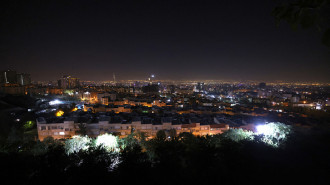Turkey, Russia, Iran, Syrian regime participate in 20th round of Astana talks
Delegations headed by the deputy foreign ministers of Turkey, Russia, Iran, Syria are in the Kazakh city of Astana for the 20th round of the Astana process talks on the Syrian conflict.
Also attending the talks taking place Tuesday and Wednesday are the UN Syria envoy Geir Pedersen, a delegation from the Syrian opposition led by Ahmed Touma, and officials from Jordan, Iraq and Lebanon.
While the talks were taking place, the Syria Civil Defence, also known as the White Helmets, reported that Russian aircraft had conducted airstrikes near the opposition-held city of Idlib.
Scenes from the first moments of our teams response to the Russian airstrikes today, Tuesday, June 20, near the city of #Idlib. #Syria #WhiteHelmets pic.twitter.com/B9nBqQMV8r
— The White Helmets (@SyriaCivilDef) June 20, 2023
The talks will be focused on a number of issues, including the reaching of a settlement in Syria, counter-terrorism issues, the release of hostages, and creating the correct conditions for the return of Syrian refugees, according to Kazakhstan’s foreign ministry.
Alongside talks surrounding the peace process, Astana will also host the second round of talks between Turkey and the Syrian regime about the prospect of a normalisation of relations.
Russian Deputy Minister of Foreign Affairs Mikhail Bogdanov stated that the normalisation meetings were "the most important meeting" of the talks and that Turkey, Syria, Russia and Iran were working on a roadmap to further the normalisation process.
Turkey is the primary supporter of the opposition Syrian Interim Government and hosts the Syrian National Coalition in Istanbul, meaning normalisation between Turkey and the Syrian regime would play a significant role in rehabilitating President Bashar al-Assad after the regime was re-admitted to the Arab League last May.
The Astana talks on Syria began in 2017 and established "de-escalation" zones in opposition-held areas of the country. However, three of the four zones were overrun by regime and Russian troops in violation of the agreements.
The Syrian conflict began in 2011 with the brutal suppression of pro-democracy protests by the Assad regime, which later led to armed conflict between regime and opposition forces. Over 500,000 people have been killed since then, mostly due to regime and Russian bombardment of civilian areas.

![Palestinians mourned the victims of an Israeli strike on Deir al-Balah [Getty]](/sites/default/files/styles/image_684x385/public/2024-11/GettyImages-2182362043.jpg?h=199d8c1f&itok=xSHZFbmc)


![The law could be enforced against teachers without prior notice [Getty]](/sites/default/files/styles/image_684x385/public/2178740715.jpeg?h=a5f2f23a&itok=hnqrCS4x)
 Follow the Middle East's top stories in English at The New Arab on Google News
Follow the Middle East's top stories in English at The New Arab on Google News

![Thousands of people have fled from Lebanon to Syria as a result of Israel's war [Getty]](/sites/default/files/styles/image_330x185/public/2024-11/GettyImages-2180619380.jpg?h=199d8c1f&itok=q4PK1BtW)
